Like other families across the country, the Andersons of Baker City made it through a challenging school year, with its unexpected end. With four kids, the house was busy and the internet wasn’t always stable, but Quinn Anderson is proud of how his kids handled the adversity.
“They adapted to the change. It wasn’t the easiest, but they did great,” he said.
Amanda Anderson spent her days with the kids while Quinn Anderson was at work.
She said her older sons, ages 12 and 10, gained independence and took ownership of their learning. She spent a lot of time working with Maggie, 6, on writing.
“It was hard, and I did it anyway,” Maggie said.

The Anderson family lives in Baker County, in eastern Oregon. Two of their kids are returning to Summer Academy, a program to help reduce student learning loss. This summer, teachers have invited students who didn’t participate in distance learning.
Courtesy Amanda Anderson
But now the school year is over. And though it is unclear what fall might look like in the Baker School District, Summer Academy, which the district hosts every year to minimize the seasonal learning loss known as “summer slide,” will take place with only slight modifications.
“You sit in a class, you do some math, you do some reading, some writing,” said Reggie Anderson, who’s 12 and did Summer Academy last year. “You do a lot of fun stuff – you go on a bunch of field trips, which is probably not going to be happening this year!”
Reggie is right. Field trips aren’t happening this year.
But the Andersons are lucky. For many other students around the state, the usual summer activities and programs are not happening because of COVID-19.
A survey of districts educating 70% of Oregon’s students, conducted by OPB and The Oregonian/OregonLive, found that most districts are doing their traditional in-person summer programs from a distance, continuing the school-year model ordered by Gov. Kate Brown in March.
As the number of COVID-19 cases statewide has surpassed 7,000, Baker County’s number of cases — one — has stayed the same. Amanda Anderson is still concerned about the virus, but she said it’s time to get back to some activities the pandemic interrupted.
“There’s definitely, as a parent, concern about that,” Anderson said. “But I think for the most part these kids are just ready to go back to school. I’m interested to see if we can do it in this kind of situation and be successful without huge spikes.”
She said her children have been practicing wearing their masks. Each child’s is decorated with characters from a favorite book or movie. For Maggie, it’s a scene from “Frozen.” Anderson’s older sons both have Harry Potter-themed masks.
Not a 'normal' classroom
Baker’s Summer Academy has to follow state guidelines. Students will be in classes of no more than 10 plus a teacher. Breakfast and lunch will be dropped off at the classroom door.
Aysha Vidales, who teaches English as a second language, says many teachers and students are ready to go back to class.
“I’m very concerned about the virus and safety,” she said. “But I think as teachers and as a district, we have put safety at the utmost. We’re following every guideline that the state puts out. It’s going to be even more restricted than what we might see in the fall.”
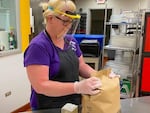
In the Baker School District, a food service employee prepares meals for students. All school staff will wear these face shields, created by Baker Technical Institute Students, for school programming this summer.
Courtesy of Angela Lattin
There will be temperature checks in the morning and teachers will wear clear face shields. Plexiglass dividers will wall off desks and there will be a lot of hand washing. Students will be encouraged to wear masks.
“I’m teaching a first-grade class,” Vidales said. “I usually teach older kids. I don’t know how I’m going to keep masks on first-graders in the middle of summer, but hey, we’re all up for the challenge, right?”
The students tapped to attend the program will differ somewhat from past years. Vidales and her colleagues have extended invitations to returning Summer Academy families, but this year they’re also inviting students who did not participate in distance learning.
“We are targeting those kids who maybe didn’t get that last quarter of instruction or didn’t participate fully so that next year when they get to school, hopefully, we’ll have been able to hit some of those standards,” Vidales said.
One Summer Academy staple — field trips and guest visits from community partners — won’t work in a COVID-19 world, a sure bummer for some students. Instead, the guests will enter the classroom remotely, on a big screen set up in the classroom.
Maggie Anderson’s favorite class last summer was cooking, taught by a local teacher with chef know-how. Instead of being in-person, this year, she’ll be on a screen.
“She’s going to be live-streaming from her spot onto that TV and then we’ll have all of the ingredients in the classroom,” Vidales said.
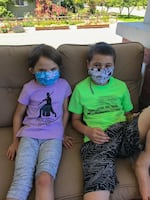
Maggie Anderson, 6, and Orrin Anderson, 6, with their themed masks. Summer programming in the Baker School District will be in-person, and masks are encouraged.
Courtesy Amanda Anderson
But even with all of the changes students will see in Baker’s summer program, parent Amanda Anderson sees the value it provides for her family.
“They still get to enjoy a regular summer, but it’s so enriched by these other activities that I couldn’t give them as much,” Anderson said.
Learning to share at home
In other districts, summer learning has moved online, even for the youngest students.
Katherine Pears is a senior scientist at the Oregon Social Learning Center in Eugene where she directs a program to help 5-year-olds in Lane County transition to kindergarten. Traditionally, the program consists of in-person lessons for both students and parents to prepare families for school.
“We focus on early academic skills as well as a heavy focus on social skills, like sharing,” Pears said.
But because of COVID-19, Pears moved her program, which starts in July, online.
That will shift a lot of the responsibility to parents. Instructors will break down lessons for parents to share with their incoming kindergarteners at home, and parents will meet virtually to talk through what works and what doesn’t.
Pears said the virtual model might not replace the in-person experience of children getting familiar with a school environment and learning to navigate social situations. But school in the fall will likely be different for any child, regardless of whether they’re entering into kindergarten or 12th grade.
“I think that is going to be a huge challenge no matter what,” Pears said.
Rachel Morris has been leading a pilot of the online version of kindergarten transition with a group of parents. At first, she was nervous they wouldn’t want to talk and share their experiences teaching at home. But after a few weeks, she said, it became like a support group.
“It’s also a great place to take on some new skills that you can practice in your home,” Morris said.
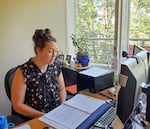
Rachel Morris hosts a virtual session for parents of incoming kindergarteners in Lane County.
(Courtesy Katherine Pears)
During a recent parent session, Morris listened to parents talk about how their children have been sharing.
“Now you can just start talking about what will this look like in kindergarten, sharing space with even more kids,” Morris said during the recent session. “This is a lot of how kindergarten will be — sharing time, sharing space, sharing materials.”
A summer without SUN School
At more than 90 sites around Multnomah County, after school SUN programs provide more than tutoring or a place for kids to spend time. They offer a community for students, a way to ask for help from someone who is not a teacher, and for family support.
Damein Roache manages the SUN program at Centennial High School in east Portland. He describes himself as a mentor who focuses on academics and making students realize the importance of good grades over other activities, like athletics.
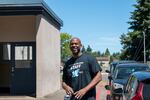
Damein Roache manages the SUN program at Centennial High School.
Elizabeth Miller / OPB
Roache and other SUN program managers shifted their work quickly after COVID-19. They opened food pantries and helped families pay their bills. They helped families figure out where they could go for support.
Now that it’s summer, SUN managers are still offering food boxes and helping families with bills. But the summer programming they usually hold in-person is canceled.
Roache was excited for his “Ninth Grade Counts” sessions this summer. It’s a program to help incoming high school freshmen who had a shaky experience in middle school earn credit toward high school and get familiar with the school.
“It’s an opportunity to get a fresh head start,” Roache said.
He likes sharing his knowledge and life experience with the students, helping them get ready for high school. He still may try to offer something online, but he wants to make sure it’s engaging and worthwhile.
“The last thing they want to do is go back and do more virtual,” Roache said.
Desiree Gutierrez manages the SUN program at Oliver Elementary in Southeast Portland. Her program normally serves between 35 and 60 families during the year but has been serving over 300 weekly with food and activity kits since the pandemic started, she said.
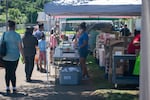
SUN site manager Desiree Gutierrez passes out food at a weekly food giveaway at Parklane Elementary in East Portland. In past weeks, they’ve passed out activity kits for kids to take home.
Elizabeth Miller/OPB
With the school year over, she’s hearing from parents wondering if her SUN program is happening this summer.
“Everybody is just looking for something to do and have their kids be active,” Gutierrez said.
She’s still figuring out how best to serve Oliver Elementary families. She and fellow SUN officials have a survey out to families asking them what they’d like to see this summer, whether virtual classes, check-ins or activity kits.
Right now, she said, it’s more about keeping in contact with kids.
SUN managers in the Centennial School District are also trying to get students away from screens.
“A lot of the families have talked about how they’re tired of online learning. I get that,” said Josiah Green, SUN manager at Powell Butte Elementary, also in Southeast Portland.
Green is planning three “hybrid” classes for students this summer: one in which families will receive a slow cooker and ingredients to make a meal, a STEM class with hands-on experiments, and a scavenger hunt around the community. He says the offerings will be a way to keep students learning in a fun and engaging way.
“I want them to unplug from the computer and enjoy themselves somehow,” Green said. “The students this year have missed out on a lot.”
This story was edited by Betsy Hammond at The Oregonian/OregonLive.